The digital divide has long been recognized as a factor contributing to the economic marginalization of low-income communities, particularly Black, Indigenous, and other communities of color (BIPOC communities). The pandemic transformed the digital divide from a long-simmering issue to an immediate crisis as schools, training programs, and essential services rapidly moved from in-person to virtual in March 2020.
COVID-19 Response
The City of Seattle’s Office of Economic Development and Seattle Information Technology recognized that low-income job seekers were among those most immediately impacted by the shutdown and least likely to have access to a device and internet connection in their homes. As a response to the COVID-19 emergency, they immediately reached out to Seattle Jobs Initiative to determine how to identify those in need and establish a process for getting those individuals connected to the internet and ensure they had a functional laptop to access training and services. Together, they developed Digital Bridge, a pilot project to improve digital access for low-income job seekers in Seattle and articulate the steps needed for larger-scale program delivery and community impact.
Digital Bridge Project Launch
The Digital Bridge demonstration project launched in July 2020 with funding from the City of Seattle Office of
Economic Development and Comcast. Employment support program partners included Seattle Goodwill, Partners
in Employment (PIE), Pacific Associates (PA), Uplift Northwest (formerly Millionair Club Charity or MCC), and the
Congolese Integration Network. Previous digital equity project collaboration brought in the Technology and Social
Change Group (TASCHA) at the University of Washington Information School with funding from the University of
Washington Population Health Initiative to assist with the evaluation and InterConnection as an equipment and
internet provider.
Between July 1st and December 31st, 2020, SJI, Seattle Goodwill, PIE, PA, and Uplift Northwest distributed 193 laptops and 174 wireless internet hotspots to job seekers and workforce training participants. These devices allowed those individuals to access the internet, training, services, and jobs while maintaining the social distance required during COVID-19.
Pilot Project Evaluation
Digital Bridge was a challenging but successful pilot program. All partners are using the launch experience to
improve service delivery. The work of Digital Bridge is continuing with additional funding. The authors’ and our
organizations’ intent is that this evaluation serves to inform scaling, improvements, and the development of
similar programs and the policies and investment necessary to deliver quality, effective programs for un- and
underemployed job seekers on their career and digital opportunity pathways.
This report was a collaborative effort of Seattle Jobs Initiative, the Technology and Social Change Group at the University of Washington Information School, The City of Seattle Office of Economic Development, and the Seattle Information Technology department.
Many thanks to participants and staff at Seattle Jobs Initiative, Goodwill, Pacific Associates, Partners in Employment, and Uplift Northwest for their feedback and input.
Evaluation research was funded in part by the University of Washington Population Health Initiative.

Recent Comments